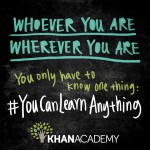Research: Russell Quaglia, President and Founder of the Quaglia Institute for Student Aspirations, recently conducted a study on the importance of student voice in schooling and student achievement. He found that students who are engaged are 16 times more likely to want to do well in school and concludes that “students who feel respected and have a sense of control and purpose over what they do at school have a much greater chance of doing well.”
Practice: At Chrysalis we recogniz e the importance of student voice and engagement in learning. We listen to students’ wants and needs and personalize their educational program to them. They have a say in their schedule, the selection of their teachers, and the direction of their classes. When we receive a new student we’re not only assessing where they are academically, but trying to connect with them on a very human level to understand their goals and help them find purpose in school. All of this adds up to engagement, which forms the basis for any and all academic work that follows.
e the importance of student voice and engagement in learning. We listen to students’ wants and needs and personalize their educational program to them. They have a say in their schedule, the selection of their teachers, and the direction of their classes. When we receive a new student we’re not only assessing where they are academically, but trying to connect with them on a very human level to understand their goals and help them find purpose in school. All of this adds up to engagement, which forms the basis for any and all academic work that follows.
 Research: October is
Research: October is  Research: Research on the brain and in education clearly shows that many of the practices held tightly by traditional schools are flawed and even harmful to continue. Even though we can all see a desperate need for change, schools remain status quo, with rigid structures and a focus on norms, efficiency, obedience, and passive learning. Marilyn Ferguson described the need for a paradigm shift in education in her classic book,
Research: Research on the brain and in education clearly shows that many of the practices held tightly by traditional schools are flawed and even harmful to continue. Even though we can all see a desperate need for change, schools remain status quo, with rigid structures and a focus on norms, efficiency, obedience, and passive learning. Marilyn Ferguson described the need for a paradigm shift in education in her classic book,
 Research: The
Research: The 

 Research: A
Research: A 